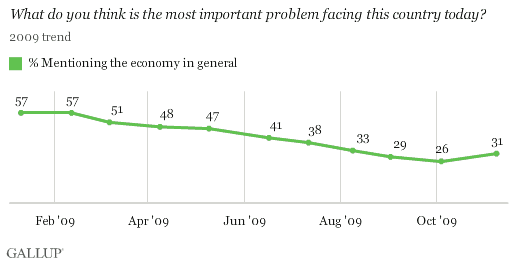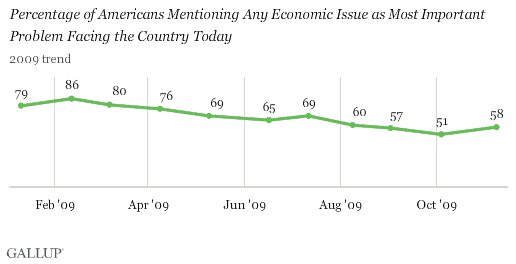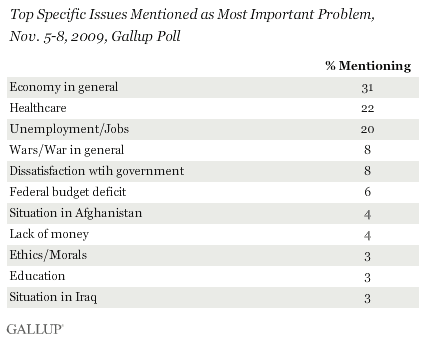PRINCETON, NJ -- Gallup finds an increase after eight consecutive monthly declines in the percentage naming the economy as the most important problem. Now, 31% of Americans mention the economy in general terms as the top problem, up from 26% last month. Even with the modest increase, only about half as many Americans mention the economy as the nation's top problem now as at the beginning of the year.

Likewise, the percentage naming any economic issue (including the economy in general terms but also specific concerns such as unemployment or inflation) also increased in November, to 58%. This figure had also declined for eight consecutive months from its peak of 86% in February, before increasing this month.

"The 20% mentioning unemployment ties for the highest Gallup has measured since it began asking the 'most important problem' question on a monthly basis in 2001."
Americans' increased economic concern this month may be due to the higher October unemployment figures, which reached the 10% level and were reported about the time the poll was being conducted (Nov. 5-8).
Unemployment itself is mentioned specifically by 20% of Americans as the most important problem, roughly the same percentage as mention healthcare (22%). Eight percent say "war" in general terms is the top problem, not including the 4% who specifically mention the war in Afghanistan and the 3% who mention the Iraq war. Eight percent also say dissatisfaction with the government is the top issue facing the country.

The 20% mentioning unemployment ties for the highest Gallup has measured since it began asking the "most important problem" question on a monthly basis in 2001. Mentions of unemployment as the nation's most important problem have been higher prior to 2001 (when Gallup asked the question on an occasional basis), including the early 1990s, early 1980s, and late 1970s.
Republicans, Democrats, and independents show a good deal of consensus on the top problems facing the country -- the economy in general, unemployment, and healthcare -- and there is little notable variation in the percentage of each group naming these problems.
Bottom Line
Throughout 2009, the economy has remained the dominant concern for Americans, though that concern had been easing since February. But in November, amid double-digit unemployment, Americans' economic anxiety is on the rise again, though still far below the levels of early 2009.
Survey Methods
Results are based on telephone interviews with 1,008 national adults, aged 18 and older, conducted Nov. 5-8, 2009. For results based on the total sample of national adults, one can say with 95% confidence that the maximum margin of sampling error is ±4 percentage points.
Interviews are conducted with respondents on land-line telephones (for respondents with a land-line telephone) and cellular phones (for respondents who are cell-phone only).
In addition to sampling error, question wording and practical difficulties in conducting surveys can introduce error or bias into the findings of public opinion polls.
